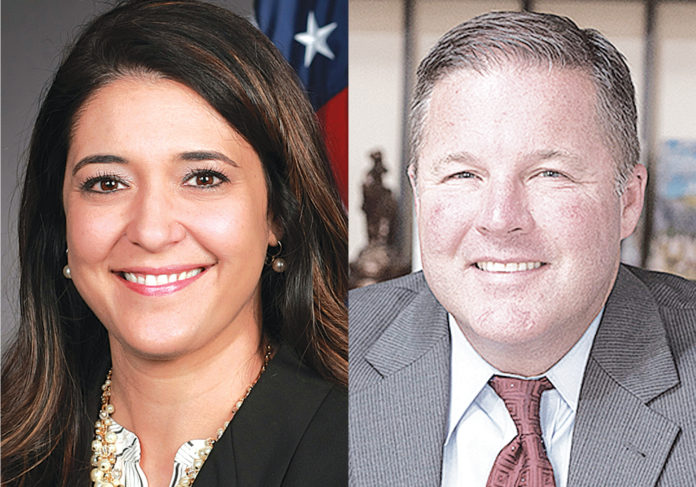By Tim Farley, News Editor – State lawmaker Lonnie Paxton doesn’t believe the legislature can pass a budget that will gain Gov. Mary Fallin’s signature.
“It’s practically an impossible feat to accomplish with 640,” he said.
640 refers to State Question 640 which voters approved in March 1992. The measure amended the Oklahoma Constitution to add restrictions on how revenue bills can become law. Under SQ 640, a revenue bill can become law only if it is approved by a three-fourths vote of the Senate and House and is signed by the governor.
In addition, a revenue bill can become law if it is referred by the legislature to a vote of the people at the next general election and receives a majority approval.
Since 1992, Oklahoma voters have approved only one state question to raise taxes, which was the tobacco tax in 2004. A proposal to raise the motor vehicle tax was defeated in 2005.
“At the time (in 1992), the thought process was if things were in that bad of an emergency, the legislature could muster enough votes to pass a (revenue) bill,” said Paxton, who represents Okarche.
However, the votes haven’t come, including several from a Republican group known as the Platform Caucus. Instead, special interest groups, including the oil and gas industry, have pushed to keep revenue bills from being approved.
“We’ve had tax payers and tax consumers out here and it doesn’t take much to influence one-quarter of one chamber,” Paxton said. “We need to take another look at 640.”
State senators approved a tax package by the needed three-fourths majority, but House members from both parties stalled the measure.
Paxton (R-Senate, District 23) said lawmakers are now examining ways that require only a 50 percent approval to raise state revenues. Some ideas include the elimination of tax credits and exemptions.
“That’s the easiest way to get things done,” he said.
Paxton isn’t alone with his thoughts about revisiting SQ 640. State Senator Stephanie Bice (R-Edmond) said the constitutional amendment is large of a hurdle to overcome in this instance.
“Getting past that three-fourths majority has impacted state agencies from providing core services,” she said. “It’s a daunting task to get that many people on board.”
Paxton voted for the budget and the revenue measures presented to Fallin. Instead of signing the budget, Fallin used the line-item veto and approved only certain parts of the budget that allowed continued funding for the Department of Human Services, healthcare and corrections.
“What she did was protect the most vulnerable of our citizens and I agree with that,” Paxton said.
Fallin called a special session so lawmakers could reach a budget agreement, but that failed. She is expected to call a second special session.
“We either go back and find new revenue or make more cuts,” Paxton said.
If a budget passes, it will require bipartisan support since some GOP members are against any tax increase, whether on cigarettes, gas or an increase on the gross production tax.
“We will have to work together,” Paxton said. “But all I’ve seen is lots of press conferences and not enough solutions. I’ve never been more frustrated than working in the legislature.”
Paxton believes the decisions legislators must make in a second session will be “life threatening in some cases.
“We have a band-aid on the budget right now, but it’s not fixed. It’s dysfunctional,” he said.
Bice was upfront with her comments about the House being unable to pass the revenue measures.
“We are doing a disservice to our citizens by not raising recurring revenues,” she said. “So far, we have reduced the number of reliable revenue sources such as income tax and the gross production tax. The reality is we’re currently cutting the roads and bridges fund to make room for core services. We can’t keep robbing Peter to pay Paul and be better long term.”
Bice complained the lawmakers have used one-time funds, revolving accounts, carryover money and funds from the state’s Rainy Day fund to balance the budget the last three years.
“We’ve been $600 million in the hole, $1.3 billion another year and then $850 million to $900 million. The Rainy Day fund is mostly depleted. Some people say we need to cut all of the waste, fraud and abuse, but we’ve cut some agencies as much as 40 percent since 2009.”
Raising motor vehicle fuel taxes should be a major recurring revenue source, Bice said.
“The motor fuel tax hasn’t been raised in 30 years. If it were increased six cents per gallon, that would increase the cost to the average citizen $36 a year. What some people don’t think about is 40 percent of the fuel purchased in Oklahoma comes from people out-of-state. With I-40 and I-35 running directly through the state, a significant amount of revenue would come in,” she said.
Oklahoma currently ranks 50th in the amount charged for motor fuel tax, Bice said.
Bice and several other lawmakers favor raising the cigarette tax and allocating those funds to healthcare agencies. A tax increase of $1.50 per pack would raise about $215 million, lawmakers claim.
“My thoughts are we have to come to a compromise. Yes, I’m all for creating efficiencies but there’s also the reality of increasing revenues,” Bice said. “I don’t think continuing to cut education and not getting teachers a raise is in the best interest of the state long term.”
Like her colleague from Tuttle, Bice isn’t optimistic about a budget agreement in a second special session.
“The animosity has built up. Politics will get in the way of good policy,” she said.






